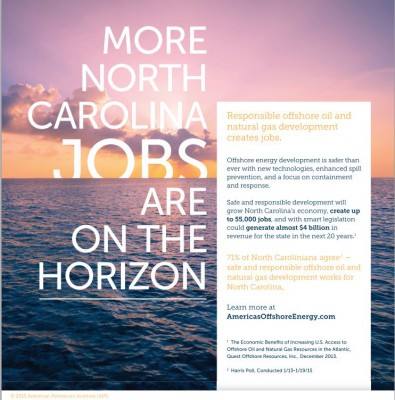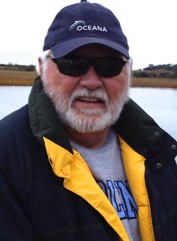An oil industry lobbying group is fighting back against mounting resistance in coastal communities to proposed Atlantic offshore oil and gas drilling with a multi-state advertising blitz touting the potential benefits, but environmental advocates aren’t backing down.

Print ads promoting offshore energy development as safe, responsible and economically beneficial began running Oct. 28 in North Carolina, Virginia and South Carolina newspapers, including the Wilmington Star-News. Radio advertisements with a similar message started earlier in the month. Opponents say the ads are misleading.
Supporter Spotlight
Randy Sturgill of Southport, the southeast campaign coordinator for national conservation group Oceana, called the ad campaign a “desperate attempt to stem the tide of growing opposition” to drilling on the Atlantic outer continental shelf, or OCS, off North Carolina and other states.
“The information in the ad is from a flawed report, an old flawed report,” Sturgill said of the ads paid for by the American Petroleum Institute and its state affiliate, the N.C. Petroleum Council, or NCPC. “They’re still using numbers that have time and time again been proven to be inaccurate. They are grasping at straws. It’s smacks of desperation.”
David McGowan, NCPC’s executive director, said in a press release announcing the campaign that the petroleum industry already supports more than 140,000 jobs in North Carolina. Oil and natural gas development in the Atlantic OCS could create an additional 55,000 jobs for North Carolinians, he said. It would also help drive down energy costs for consumers and raise nearly $4 billion in state tax revenues by 2035 if the state succeeds in getting a revenue-sharing agreement with the federal government.
“North Carolinian voters embrace safe, responsible offshore energy development,” McGowan said. “With new technologies, offshore energy development is safer than ever and continues to drive coastal U.S. economies while existing with tourism and fishing. This opportunity is important to North Carolina’s future, expanding job opportunities and a key engine for the state economy.”

McGowan declined the opportunity to respond to critics of the campaign, including Sturgill. “At this point, we are going to let the press release serve as our public comments on the ad campaign,” he said.
Supporter Spotlight
The press release echoes the projections that appear in the ads, which are tailored for the individual states. However, the ads disclose that the figures come from a 2013 report by Quest Offshore Resources, a Texas-based company that does research for the industry.
Sturgill said the report had been widely discredited. He pointed to a more recent study by Doug Wakeman, an economics professor at the Meredith College School of Business in Raleigh and a member of the N.C. Coastal Federation’s board of directors. Wakeman contends the report’s employment and economic projections are questionable.
“It’s a matter of where they actually expect to be most successful in terms of drilling,” Wakeman said in June. “The place where the most attractive oil deposits are is fairly well north along our coast. Does that mean oil production and those jobs would go to more to places like Virginia Beach and the Norfolk area?”
Future oil prices are also a critical factor in trying to determine the economic benefits of drilling for the state, Wakeman explained. Higher prices not only mean greater profits for the oil companies, he said, but they also encourage drilling in economically marginal places.

When oil sells at $120 a barrel, as it did a couple of years ago, deposits that are expensive to drill, such as those in the deep-water Atlantic, are profitable, Wakeman said. They become less profitable as the price drops.
The Quest report and industry proponents suggest untapped natural oil and gas resources in the Atlantic could prove to be huge – 1.34 million barrels of oil equivalent per day by 2035. The Quest report was released in December 2013 before the federal Bureau of Ocean Energy Management, or BOEM, announced its proposed leasing program for the mid-Atlantic. The 2017-2022 offshore oil and gas leasing program unveiled in January includes a 50-mile barrier and one lease sale in 2021 in federal waters off the Atlantic coast stretching from Virginia to Georgia.
Quest’s report does not consider the 50-mile buffer. It assumes leasing in the mid and south Atlantic would begin in 2018 and does not include the single lease sale cap. Those restrictions have an effect on the numbers in the Quest report, which has been routinely cited by politicians, including Gov. Pat McCrory.
Wakeman said the report assumed that the amount of oil that would be found with new technology would mimic what’s been found in other places. The economic projections in the report can be regarded as “likely overestimates,” he said.

In terms of lower prices, consumers may not notice a difference at the pump. Though nearly all domestic oil is kept in the U.S., the Organization of Petroleum Exporting Counties, or OPEC, still sets gas prices. Consumers in Alaska, which has the lowest gas tax in the country, still pay about 50 cents more per gallon than in North Carolina. Gas prices in other oil-producing states, including Texas and Louisiana, aren’t much cheaper than what North Carolinians pay today.
Stanley Riggs, an East Carolina University geologist and an expert on the North Carolina coast and its offshore waters, is also critical of industry projections. During a recent talk sponsored by the Sierra Club in Morehead City, Riggs noted that numbers cited by the industry were the same almost 30 years ago, in 1988, when a moratorium on drilling was put in place.
Sturgill also noted that in citing the potential economic benefits for the state – “with smart legislation (drilling) could generate almost $4 billion in revenue for the state in the next 20 years,” the ad states – the study assumes the federal government will share royalties from lease sales and production with the states. Such an agreement exists only on the Gulf Coast and that program is out of favor, with federal officials working to eliminate it.
A revenue-sharing bill for the East Coast states has been introduced, pushed by McCrory and the state’s pro-drilling Republican senators, Thom Tillis and Richard Burr. But the Obama administration’s Interior Department is opposed because the measure would add to the federal deficit.

Carteret County Shore Protection Officer Greg “Rudi” Rudolph recently told the county’s beach commission that if a revenue-sharing were to pass, he believes the president would veto it. Obama is proposing that offshore revenue sharing in the Gulf be used instead for “broad natural resource, watershed and conservation benefits for the entire nation.” It’s part of his $4 trillion budget, unveiled in February.
Interior Secretary Sally Jewell was widely quoted as saying revenue sharing for select Gulf Coast states should be re-examined to provide “a fair return to the taxpayers across the whole United States.” She said the Land and Water Conservation Fund would be a good place for the money to go. Others have noted that the revenue sharing for the Gulf was enacted only after Hurricane Katrina devastated the area in 2005, and was largely seen as an effort to help repair the area’s economy.
The industry ad also states that, “71 percent of North Carolinians agree (that) safe and responsible offshore oil and gas development works for North Carolina,” but Sturgill said that level of agreement is doubtful.
Numerous coastal towns – including Emerald Isle, Morehead City, Beaufort and Atlantic Beach in heavily Republican Carteret County – have responded to local opposition to drilling by adopting resolutions. Wilmington, Carolina Beach and others are on record as opposing offshore seismic testing and drilling. More than 85 East Coast communities have approved similar resolutions. Opponents cite the potential damage to the tourist and fishing industries. Sturgill mentioned other polls which disagree with the industry’s numbers.
Sturgill said opposition has continued to grow. He said the anti-drilling movement has “exploded,” with the pace of resolution-adopting growing rapidly and the sentiment spreading inland, all the way to the state’s mountains.
“It’s not just coastal residents who care about the coast and what happens to it,” he said. “People all across the state view the coast and its natural resources as treasures. They don’t want to see the infra-structure that goes with the oil industry at our coast. They don’t want to risk the loss of those treasures for a small number of jobs and a very limited supply of oil. It’s not worth it.
“People are seeing through the industry’s blatant propaganda,” Sturgill added. “They know there is plenty of credible evidence out there to put to rest the industry’s claims. They’ve seen it.”







